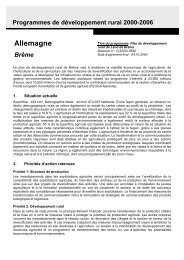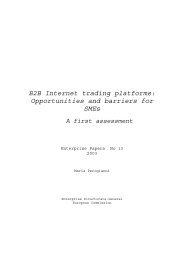pdf 76kb - food-MAC
pdf 76kb - food-MAC
pdf 76kb - food-MAC
Create successful ePaper yourself
Turn your PDF publications into a flip-book with our unique Google optimized e-Paper software.
Effects on third world trade<br />
The Presidency has raised another important question in asking whether developing<br />
countries might not be disadvantaged by rising quality standards and the increasing<br />
demands made by purchasers.<br />
While it is true that in the Doha Development Round we have had more success<br />
than ever before in binding the developing countries into a mutually beneficial, freer<br />
trade environment, we cannot avoid the fact that, as world agriculture becomes<br />
more competitive, quality standards and product differentiation are more and more a<br />
reflection of consumer demand. That is part and parcel of the market-orientated<br />
approach and the Presidency is right to raise the question of what its implications<br />
are for development policy in general. If we accept that there is a sense in which<br />
the customer is always right, and so the demands of purchasers must be met, then<br />
we must also accept that assistance to developing countries will need to address<br />
this issue.<br />
Subsidiarity<br />
We are all well aware that our administrations are fully involved at present with the<br />
setting in place of the 2003 CAP and associated sector reforms. The Commission’s<br />
aim is based on the respect of the principles of the Council decision through<br />
common rules, which respect the specificity of each Member State’s agriculture.<br />
Nor should we forget that a crucial point of the 2003 CAP reform has been the<br />
simplification it will bring. So the Commission is on its guard to ensure that<br />
unnecessary complication is avoided in order to attain the more important political<br />
goal of a better and more clearly defined set of standards for EU agriculture.<br />
Thus the basic plan for the issues of subsidiarity in decision-making, and the goals<br />
of limiting the administrative burden and simplifying the regulatory environment,<br />
have been laid out. In terms of on-the-ground implementation, Member State<br />
authorities will retain the basic duties assigned to them.<br />
Concluding Remarks<br />
The fact that issues concerning <strong>food</strong> quality should now have come to the fore<br />
should not surprise us. Much of the public debate surrounding the 2003 CAP reform<br />
concerned the impact on farming and the countryside. However, given the<br />
developments in our society, and in particular its <strong>food</strong> and <strong>food</strong> purchasing habits,<br />
the impacts of CAP reform on the <strong>food</strong> industry are equally important. The<br />
Presidency paper raises interesting questions as to how agricultural policy and its<br />
management should react to the demands of the <strong>food</strong> industry and consumers. We<br />
shall all need to devote our attention to finding the best possible answers.<br />
4





